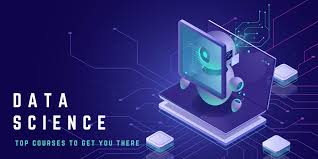The Importance of Taking a Data Science Course
Data science has become an essential field in today’s digital age, with vast amounts of data being generated and collected every day. Taking a data science course can provide you with the skills and knowledge needed to make sense of this data and extract valuable insights from it.
One of the key reasons to consider enrolling in a data science course is the high demand for professionals with data science skills. Companies across various industries are seeking individuals who can analyse data effectively and use it to drive informed decision-making.
By learning data science techniques such as data analysis, machine learning, and statistical modelling, you can enhance your career prospects and open up new opportunities in fields such as finance, healthcare, marketing, and more.
Moreover, taking a data science course can help you develop critical thinking skills and improve your problem-solving abilities. You will learn how to approach complex datasets, identify patterns and trends, and communicate your findings effectively to stakeholders.
Whether you are a student looking to kickstart your career or a professional seeking to upskill, investing in a data science course can be highly beneficial. It equips you with the tools and techniques needed to thrive in today’s data-driven world.
Overall, the importance of taking a data science course cannot be overstated. It not only enhances your employability but also enables you to make meaningful contributions to your organisation by leveraging the power of data.
Top 7 Essential Tips for Excelling in a Data Science Course
- Understand the fundamentals of statistics and mathematics.
- Learn to use programming languages like Python and R for data analysis.
- Practice working with real-world datasets to gain practical experience.
- Explore different machine learning algorithms and techniques.
- Stay updated with the latest trends and technologies in data science.
- Develop strong problem-solving and critical thinking skills.
- Collaborate with peers and participate in data science projects or competitions.
Understand the fundamentals of statistics and mathematics.
To excel in a data science course, it is crucial to grasp the fundamentals of statistics and mathematics. Understanding statistical concepts such as probability, hypothesis testing, and regression analysis provides a solid foundation for interpreting and analysing data accurately. Proficiency in mathematics, including linear algebra and calculus, is essential for implementing advanced machine learning algorithms and models. By mastering these fundamental principles, students can enhance their analytical skills and effectively leverage data to derive meaningful insights in the field of data science.
Learn to use programming languages like Python and R for data analysis.
To excel in a data science course, it is crucial to master programming languages such as Python and R for effective data analysis. These versatile languages offer powerful tools and libraries that facilitate data manipulation, visualization, and statistical modelling. By acquiring proficiency in Python and R, students can enhance their analytical capabilities, streamline data processing tasks, and gain a competitive edge in the field of data science.
Practice working with real-world datasets to gain practical experience.
To maximise the benefits of a data science course, it is crucial to practice working with real-world datasets to gain practical experience. By applying the theoretical knowledge learned in the course to actual data sets, students can develop hands-on skills in data analysis, interpretation, and problem-solving. This practical experience not only reinforces learning but also prepares individuals for real-world challenges they may encounter in their future careers as data scientists.
Explore different machine learning algorithms and techniques.
When undertaking a data science course, it is crucial to explore a variety of machine learning algorithms and techniques. By delving into different approaches, such as regression, classification, clustering, and deep learning, you can gain a comprehensive understanding of how to apply these methods to real-world data sets. This exploration not only broadens your knowledge base but also equips you with the versatility to select the most appropriate algorithm for specific data analysis tasks. Embracing diverse machine learning techniques enhances your problem-solving skills and empowers you to extract valuable insights from complex data structures efficiently.
Stay updated with the latest trends and technologies in data science.
It is crucial to stay updated with the latest trends and technologies in data science to remain competitive and relevant in the field. By keeping abreast of advancements in data science, such as new algorithms, tools, and methodologies, you can enhance your skills and knowledge, allowing you to tackle complex data challenges more effectively. Continuous learning and adaptation to emerging trends in data science will not only broaden your expertise but also position you as a valuable asset in an ever-evolving industry.
Develop strong problem-solving and critical thinking skills.
Developing strong problem-solving and critical thinking skills is crucial when pursuing a data science course. These skills enable students to approach complex datasets with a structured mindset, identify patterns, and extract meaningful insights. By honing their problem-solving abilities, individuals can tackle real-world data challenges effectively and derive innovative solutions. Moreover, fostering critical thinking skills allows students to evaluate data objectively, make informed decisions based on evidence, and communicate their findings persuasively. In the dynamic field of data science, the ability to think critically and solve problems efficiently is essential for success and professional growth.
Collaborate with peers and participate in data science projects or competitions.
Collaborating with peers and actively participating in data science projects or competitions can greatly enhance your learning experience during a data science course. By working with others, you can gain valuable insights, perspectives, and new ideas that you may not have considered on your own. Engaging in real-world projects or competitions allows you to apply your knowledge in practical scenarios, sharpen your skills, and build a strong portfolio that showcases your abilities to potential employers. Additionally, collaborating with peers fosters a sense of teamwork and community within the data science field, creating opportunities for networking and future collaborations.

No Responses